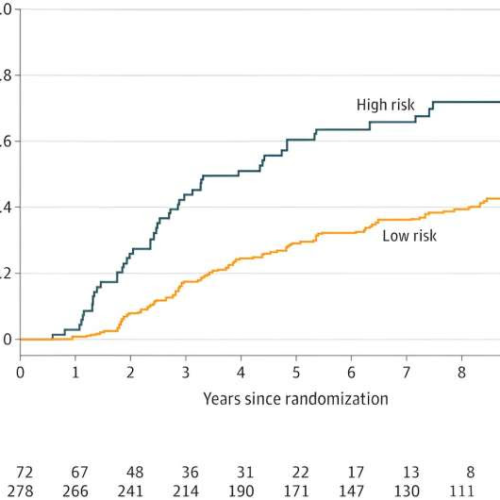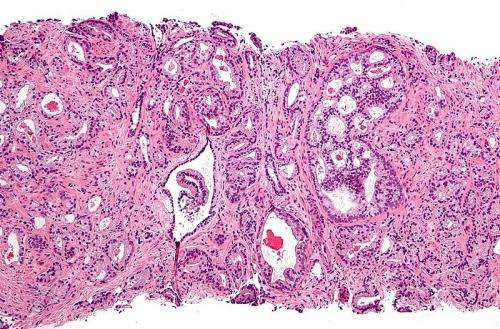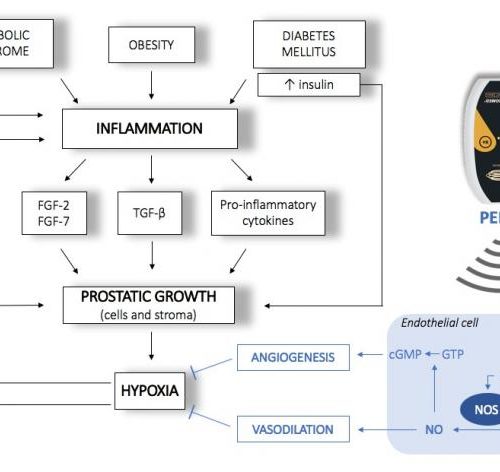A new paper in the Journal of the National Cancer Institute indicates that patients may benefit if doctors stop calling certain early-stage changes to the prostate “cancer” at all. The paper is titled “When is prostate cancer really cancer?”. Prostate cancer is the second leading cause of cancer death worldwide in men, but far more...
Tag: <span>prostate</span>
Prostate Meds Tied to Reduced Risk for Lewy Body Dementia
Certain medications that are used to treat benign prostatic hyperplasia (BPH) are associated with a reduced risk for dementia with Lewy bodies (DLB), the second most common neurodegenerative type of dementia after Alzheimer’s disease. Investigators found older men taking alpha-1 blockers terazosin, doxazosin, or alfuzosin (Tz/Dz/Az) were 40% less likely to develop DLB than those...
Improving prostate cancer screening for transgender women
by Cedars-Sinai Medical Center Credit: Pixabay/CC0 Public DomainTransgender women are still at risk for prostate cancer. A new study led by Cedars-Sinai Cancer investigators, published in JAMA concludes that current screening guidelines could miss early-stage prostate cancer in transgender women on hormone therapy. The prostate, a small gland that helps make semen, also produces a...
Prostate-specific antigen failure risk factors in nonmetastatic unfavorable-risk prostate cancer
by Justin Jackson , Medical Xpress Cumulative Incidence Curves of PSA Failure by Risk Categories. High risk category is defined as age younger than 70 years, PSA 10 ng/mL or more, and a Gleason score of 8 to 10. Credit: JAMA Network Open (2023). DOI: 10.1001/jamanetworkopen.2023.36390Research led by the Dana Farber Cancer Institute, Massachusetts, performed...
Potential causal role of human papilloma viruses (HPVs) in prostate cancers
by BioMed Central Human papilloma viruses (HPVs) – a common group of viruses known to cause cervical cancers—may also have a causal role in prostate cancer, according to a literature review published in the open access journal Infectious Agents and Cancer, supporting the case for universal HPV vaccination. James Lawson and Wendy Glenn, at the...
Noninvasive treatment for men suffering from enlarged prostate
Pulsed electromagnetic field therapy decreased prostate volume and improved the symptoms of benign prostatic hyperplasia, cites research published in Andrology PARSEMUS FOUNDATION Physicians from Sapienza University in Rome have published promising results of a small prospective interventional trial using noninvasive pulsed electromagnetic field therapy (PEMF) to treat men suffering from benign prostatic hyperplasia (BPH). After...
Prostate medicines linked to type 2 diabetes risk, study suggests
UNIVERSITY OF EDINBURGH Researchers say patients should continue to take the drugs, which are commonly prescribed to older men, but warn they may need additional health checks. The team stressed that current treatment guidelines do not need to change, based on their study of patient health records. Men with enlarged prostates are commonly prescribed drugs called 5-alpha-reductase...
Researchers pinpoint new subtype of prostate cancer
Tumors with alterations in the CDK12 gene were more responsive to immunotherapy, suggesting precision medicine approach MICHIGAN MEDICINE – UNIVERSITY OF MICHIGAN IMAGE: DEPICTION OF THE MOLECULAR PROCESSES INVOLVED IN A NEW SUBTYPE OF METASTATIC PROSTATE CANCER CHARACTERIZED BY LOSS OF THE GENE CDK12. CREDIT: ALEXANDER TOKAREV, ELLA MARU STUDIO ANN ARBOR, Michigan — Researchers led...
What is a free PSA test and what is it for?
The free prostate-specific antigen test, known as the free PSA test, is used to help detect signs of prostate cancer. The test measures the level of unbound prostate-specific antigen in the blood, which can help doctors to diagnose issues like inflammation of the prostate or cancer. Free PSA tests are often used alongside other PSA tests to...



